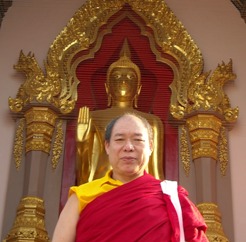
Buddhism – meditation retreat – Lama Rinchen‘s Dudjom Tersar Dzogchen Ngondro retreat 30 December 2017 – 3 January 2018
(Beginners are welcomed, registration form below)
Very few places available, please register immediately, first come first serve basis.
Please note that the retreat is now pretty full, please contact 0819855564 or ram@pluslab.com to confirm
ตอนนี้ค่อนข้างเต็มแล้วกรุณาติดต่อ 0819855564 หรือ ram@pluslab.com เพื่อสอบถามข้อมูล
พุทธธรรม – ปฏิบัติฐานโงนโดรถึงขั้นสูง (ดุดจมเตอร์ซาร์ ซกเชน โงนโดร) โดยท่านพระลามะริเชน 30 ธันวาคม 2560 – 3 มกราคม 2561
(ยินดีรับผู้ปฏิบัติขั้นเร่มต้น ลงทะเบียนด้านล่าง)
จำกัดผู้เข้าร่วม กรุณาลงทะเบียนทันที มีจำนวนที่เหลือน้อยมาก
The retreat topic is Essential Advanced Dzogchen Ngondro of Dudjom Tersar with Lama Rinchen Phuntsok (http://dongakcholing.org/LamaRinchen.html) retreat. This program will start from preliminary up to advanced practices (Dzogchen level). For this, Hinayana, Mahayana and Vajrayana will be covered. All levels of practitioner are welcomed, from new-comers to advanced.
สวัสดีครับ ท่านพระลามะรินเชน(http://dongakcholing.org/LamaRinchen.html)จะมาสอนการปฏิบัติขั้นโงนโดรฐานขั้นสูง วัชรยาน (ในสายดุดจม เตอร์ซาร์) การปฏิบัตินี้เป็นการปฏิบัติตั้งแต่ขั้นต้นถึงขั้นสูง (ระดับซกเชน) ซึ่งจะมีการสอน หินยาน มหายาน และ วัชรยาน หลักสูตรนี้เปิดกว้างสำหรับผู้ปฏิบัติใหม่/ขั้นต้น ถึงผู้ปฏบัติขั้นสูง
Dates: Saturday 30th December 2pm – Wednesday 3rd January afternoon and continue on Weekends of 6,7,13,14 in Bangkok
วัน: เสาร์ที่ 30 ธันวาคม 14.00น. ถึง พุธที่ 3 มกราคม ช่วงบ่าย ตามด้วย วันเสาร์และอาทิตย์ที่ 6,7,13,14 มกราคมในกรุงเทพฯ
Venue: Mongkol resort, near Huahin (map https://goo.gl/maps/5W2aRohs9oD2 )
สถานที่: หัวหินมงคล รีสอร์ท จังหวัด ประจวบคีรีขันธ์ (แผนที่ https://goo.gl/maps/5W2aRohs9oD2 )
Cost/ราคา: 4 nights with meals 4คืนรวมอาหาร *traveling cost not included *ไม่รวมค่าเดินทาง
-Single room ห้องเดี่ยว – Baht 5500 บาท per person ต่อท่าน
-Double room ห้องคู่ (share wih another participant ห้องร่วม2ท่าน) – Baht 3500 บาท per person ต่อท่าน
Registration deadline/สิ้นสุดวันลงทะเบียน:
Very few places left, please register immediately, first come first serve basis.
จำกัดผู้เข้าร่วม กรุณาลงทะเบียนทันที มีจำนวนที่เหลือน้อยมาก
Registration/ลงทะเบียนได้ที่:
https://goo.gl/forms/b0dcdwbD4XsdH7Ig2
Here are some details:
Lama Rinchen Phuntsok biography ชีวประวัติ
http://dongakcholing.org/LamaRinchen.html
If you have further questions you could email ram@pluslab.com or call 0819855564
หากท่านมีคำถามเพิ่มเติมสามารถติดต่อ ram@pluslab.com 0819855564
|
|
|
|
|
|
30th September 2017 – Taming Our Fears
|
|
|
Dear Friends Near and Far,
Happy Guru Rinpoche Day! Here, Phakchok Rinpoche speaks on Guru Dorje Draktsal, and details the sources of our fears and how to tame them.
Click here to view the video message
We are happy to announce that there are subtitles for this month’s message in Simplified Chinese, Traditional Chinese, French, German, Indonesian, Italian, Japanese, Nepali, Polish, Portuguese, Romanian, Russian, Spanish, Thai, Ukranian, and Vietnamese. Please click the settings wheel in the bottom right corner of the video to access these options.
We are also interested in your feedback about what teachings you would like to hear in the Guru Rinpoche messages.
Submit your feedback here
|
|
|
|
|
It is with great joy, after three years of hard work, that we are announcing the completion of the Nepal volume in our forthcoming series of pilgrimage guides dedicated to Guru Rinpoche‘s life and deeds. To inaugurate this special event, we wish to invite you to join us this autumn as we follow in the footsteps of our precious Lotus-Born Guru, Padmasambhava, travelling to the holy sites of Nepal, where he taught, practiced and accomplished the Dharma.
This, our first official Guru Rinpoche pilgrimage, will be taking place in the auspicious Tibetan Year of the Bird – the same year in which, generations ago, the precious Jarung Kashor, otherwise known as the Boudhanath Stupa, was completed and consecrated.
Six Vajra Lines Accumulation
Kyabgön Phakchok Rinpoche has asked his sangha as well as all who are inspired to take part to accumulate 10,000,000 (ten million) recitations of the Six Vajra Verse supplication yearly starting from this Guru Rinpoche Day.
So far of you have accumulated 215,489 recitations of this prayer. To reach the target of 1,000,000 a year, we need to as a group increase our effort four fold! Please help to make this goal a reality.
This blessed supplication was revealed as a treasure by the great treasure revealer Chokgyur Dechen Lingpa in the 19th century. The first three lines are supplications to three forms of Guru Rinpoche, the fourth line is requesting Guru Rinpoche to grant blessings, the fifth line is requesting that all levels of obstacles may be removed, and the sixth line is requesting that all wishes may be spontaneously accomplished.
It is taught that there is no greater refuge in these times than Guru Padmasambhava. Make this supplication with a sense of weariness towards samsara, with love and compassion towards all sentient beings, and a heart full of genuine devotion. There is no doubt that the blessings will manifest in one’s mind stream when you supplicate in this way.
You may recite this supplication during your daily practice sessions as well as while going about your daily activities.
We have started a new counter which both tracks your personal contribution as well as the unified total. The page also has more information on the chant as well as links to teachings and commentaries on this profound supplication.
Click here to contribute your accumulations
|
|
|
Sarva Mangalam
May all be auspicious!
|
|
|
|
|
ภาษาไทย ดูได้ที่นี่
Dear Friends Near and Far,Greetings to you all on this Guru Rinpoche Day. I hope you’ve all be healthy and happy.We all want to be happy. This is our fundamental aim in life, right? But often we find it difficult to achieve. When we don’t know how to deal with our own emotions and our mind then sometimes life can become very tiring and depressing. On top of that, most of us are so busy these days, which makes us even more stressed and uptight. So here I would like to share with you three simple ways that helps me deal with my emotions and thus gives me comfort.1. Creating Space
These days we have so many things to think about: our health, our family, our work, and if you’re a dharma practitioner, then on top of all that you have meditation and dharma practice to worry about. When we don’t know how to deal with them, these worries can make our minds start to slowly shrink, becoming more and more narrow, and as a consequence more and more negative. Sometimes things start to overwhelm us and we feel trapped physically. Our chest feels tight and then we let out a big sigh in an attempt to relieve ourselves of these feelings. That happens sometimes. A small problem can come to seem so big that we can’t deal with it at all.
A really good way to deal with this is to create space mentally. It helps relieve the tension and uptightness in your mind and in your body as well. Creating space is a very simple method. It’s not a Buddhist teaching or anything like that. It’s simply a technique we can apply to give ourselves space and freedom and relief from all our worrisome thoughts.
How to create space? When you have a few minutes, look ahead of you and simply imagine that you’re surrounded by empty space in all directions. Sometimes it is useful to look at the empty sky. Just imagine space everywhere: no walls, no boundaries, no buildings, nothing. And don’t start thinking about work, family, things you need to do. Simply imagine that everything is just like the vast, open sky, like empty space, and let your mind blend into the space so that it becomes just as vast and open. You can close your eyes if that helps. Imagine this spaciousness for a short while. After a minute or two you’ll start to really feel spacious mentally. Your chest will open up and you’ll feel relieved of all those tensions and thoughts that were crowding in on you just a few minutes ago. Your mind opens up and then your way of thinking changes, just like that. It takes just five or ten minutes and is so easy—that is the magic of creating space. You don’t have to believe me. Try it for yourself and you’ll see.
2. Knowing your own faults and Reducing Judgment
We all want to be happy, right? Yes or no? But what is our mind occupied with most of the time? Negative emotions, negative judgments, and negative thoughts. Look at your own mind and see the pattern of emotions. How many of them are negative? Have you ever before given this a moment’s thought?
So what you need to do first is to recognize your thought-patterns, your negative emotions and the way they arise, the way different feelings arise. Recognize, notice, but Don’t Judge. There’s a big difference between noticing and judgment. Noticing is simply recognizing and becoming aware of something: “Oh, yes, I have a problem with jealousy.” But judgment goes one step further—a step too far—and starts criticizing: “Oh, yes, I have a problem with jealousy. Oh my God, I’m such a bad person. I can’t believe I made that mistake! Oh, I feel so awful. I can’t bear it!….” Do you see the difference? Judgment has these emotional ties whereas noticing does not. So try to simply notice your faults and not judge.
The problem nowadays is not that people are not doing dharma or other spiritual practice and trying to improve. The problem nowadays is that we don’t notice and accept our own faults; so then of course we don’t improve, no matter how we might try. It’s a bit like taking medicine for an illness when you don’t even know what illness you have. So please give this a moment’s thought. Look honestly at yourself and acknowledge your own faults and mistakes.
3. Compassion and Loving Kindness
The third key I’d like to mention here is having compassion and loving-kindness. Traditionally speaking, in the Buddha’s teaching, compassion is defined as the wish for beings to be free from suffering and the cause of suffering and loving kindness is the wish for beings to have happiness and the cause of happiness. Here though, I’d like to explain compassion as meaning a basic understanding or empathy for others and loving kindness as meaning a good, kind heart.
Understanding is so important. For example, in order for a family to be happy and harmonious the parents need to understand their children, be able to see things from their point of view, and the children also need to understand their parents. It’s the same in all situations, in the office, other relationships and so on. We need to share with each other, get to know each other well, and learn to look at things from others’ perspectives; we need to put ourselves in their shoes. If somebody is shouting at you, do you think he’s happy? Do you think he’s enjoying that? No, he’s upset, stressed, and angry, and later on he might well feel a lot of regret for what he’s doing right now. Yes, many people make mistakes, but do you think they do so intentionally? Do you think they do so because they’re happy? No. So try to understand that instead of just reacting with more anger and judgment from your side. If you can do that, you’ll feel compassion.
Another aspect of compassion is that if you come to understand your own problems and gain some freedom from them, naturally compassion towards others will arise. On the other hand, when you don’t clearly notice your own problems in the first place and know what suffering you have then how can you have compassion for others? How can you wish others to be free from that suffering, suffering that you don’t even recognize clearly yourself? So first you need to see your own problem. How? When you create space, the first key, and gain some freedom from your stress and the onslaught of thoughts, you see what you’re getting out from, you see the benefits of how you become happier. From just the first point, creating space, you think, “Oh, my boss, poor guy. If he knew this method he would be in a much better place than he is now. The poor guy.”
When you have this kind of compassion, your mind becomes more and more loose. When you focus more on others, indirectly you’re reducing your focus to your ego and as a result your mind then becomes more and more relaxed, more expansive and then more intelligent. You can share these three points with anyone. It’s going to benefit them, not harm them. So these are the three keys to be happy.
Sending you all much love and affection.
Sarva Mangalam,
Phakchok Rinpoche |
|
|
|
กุญแจสู่ความสุข
แด่สหายทั้งหลายที่อยู่ใกล้และอยู่ไกล สวัสดีทุกท่านเนื่องในวันคุรุรินโปเช หวังว่าทุกท่านคงมีสุขภาพที่ดีและมีความสุข เราทุกคนล้วนต้องการจะมีความสุข สิ่งนี้คือเป้าหมายพื้นฐานในชีวิตเราจริงหรือไม่? แต่บ่อยครั้งที่เรารู้สึกว่าเป็นการยากลำบากเหลือเกินที่จะเข้าถึงความสุข เมื่อใดก็ตามที่เราไม่รู้ว่าจะรับมือกับอารมณ์และจิตใจของเราอย่างไร เมื่อนั้นเราจะรู้สึกว่าชีวิตช่างน่าเหนื่อยหน่ายและตึงเครียด ด้วยเหตุนั้นในที่นี้ข้าพเจ้าจึงอยากมีส่วนร่วมกับท่านทั้งหลายในวิถีทางสามเรื่องง่ายๆ ที่ช่วยให้ข้าพเจ้าสามารถจัดการกับอารมณ์และความรู้สึกของข้าพเจ้า ซึ่งทำให้ข้าพเจ้าสุขสบายอยู่เสมอ
ทุกวันนี้เรามีสิ่งที่ต้องคิดคำนึงถึงมากมายเหลือเกิน ทั้งเรื่องสุขภาพ ครอบครัว หน้าที่การงาน และถ้าท่านเป็นผู้ฝึกปฏิบัติธรรมด้วยแล้วท่านยังมีภาระในการทำสมาธิและฝึกปฏิบัติธรรมที่ต้องเป็นห่วงอีก เมื่อใดก็ตามที่เราไม่รู้ว่าจะจัดการกับมันอย่างไรความกังวลนี้จะทำให้จิตใจของเราหดตัวลงที่ละน้อยๆ และมีขนาดแคบลงๆ ผลลัพธ์ที่เกิดขึ้นจะเป็นไปในทางเลวร้ายยิ่งขึ้นเรื่อยๆ จนบางครั้งดูเหมือนว่าสิ่งต่างๆ เริ่มท่วมท้นหนักหน่วงจนรู้สึกเหมือนกำลังติดกับดักและยังรู้สึกแน่นหน้าอก เราจะแสดงออกอย่างชัดเจนถึงความพยายามที่จะผ่อนคลายตัวเองจากความรู้สึกเหล่านั้น สิ่งนี้คงเกิดขึ้นกับเราบ้างในบางครั้งไม่มากก็น้อย แต่เรื่องเล็กๆ เหล่านี้ก็อาจกลายเป็นปัญหาใหญ่ที่เราไม่สามารถจัดการกับมันได้
วิธีการที่ยอดเยี่ยมประการหนึ่งในการจัดการกับสิ่งเหล่านี้คือการสร้างพื้นที่ว่างทางจิตใจขึ้น วิธีนี้จะช่วยปลดปล่อยอกุศลเจตนาและความตึงเครียดทั้งในจิตใจเช่นเดียวกับในร่างกายของท่าน การสร้างพื้นที่ว่างมีวิธีการที่ง่ายมาก มันไม่ใช่การสอนคำสอนทางพุทธศาสนาหรืออะไรทำนองนั้น หากเป็นเทคนิคง่ายๆ ที่เราสามารถประยุกต์ใช้กับพื้นที่ว่างและอิสรภาพของเรา และปลดปล่อยเราจากความกังวลทั้งมวล
แล้วเราจะสร้างที่ว่างได้อย่างไร? หากท่านมีเวลาสักเล็กน้อยลองมองตรงไปข้างหน้าและจินตนาการว่าท่านกำลังถูกล้อมรอบด้วยที่ว่างทุกทิศทุกทาง หากจำเป็นบางครั้งก็อาจใช้วิธีมองขึ้นไปบนท้องฟ้าที่ว่างเปล่า เพียงแค่จินตนาการว่าทุกหนทุกแห่งล้วนเป็นที่ว่าง ไม่มีกำแพง ไมมีขอบเขต ไม่มีตึกรามบ้านช่อง ไม่มีอะไรเลย และอย่าเริ่มต้นคิดถึงการงาน ครอบครัว คิดถึงเฉพาะสิ่งที่ท่านต้องการจะทำ จินตนาการง่ายๆ ว่าทุกสิ่งทุกอย่างล้วนเป็นพื้นที่ว่างกว้างใหญ่ ฟ้าโปร่งเหมือนที่ว่าง และปล่อยให้จิตใจของท่านผสมกลมกลืนไปกับพื้นที่ว่างดังกล่าวจนกลายเป็นพื้นที่ว่างและเปิดโล่งสุดลูกหูลูกตา ท่านอาจจะหลับตาลงหากสิ่งนี้ช่วยท่านได้ จินตนาการถึงความว่างเปล่านี้สักอึดใจหนึ่ง หลังจากเวลาผ่านไปสักนาทีหรือสองนาทีท่านจะเริ่มรู้สึกถึงความว่างในจิตใจอย่างแท้จริง หน้าอกของท่านจะโล่งและท่านจะรู้สึกถึงความผ่อนคลายจากความตึงเครียดในหัวท่านก่อนหน้านี้ จิตใจของท่านจะเปิดออกเช่นเดียวกับวิธีคิดของท่านที่จะเปลี่ยนไปเช่นกัน ขั้นตอนเหล่านี้ใช้เวลาไม่มากเลยเพียงห้าหรือสิบนาทีและยังง่ายมากด้วย นั่นแหละคือความวิเศษของการสร้างที่ว่าง ท่านไม่จำเป็นต้องเชื่อฉันแต่ลองดูด้วยตนเองแล้วท่านจะรู้สึกได้ด้วยตนเอง
- 2) เรียนรู้ข้อผิดพลาดของตนเองและลดการตัดสิน
เราทุกคนล้วนต้องการจะมีแต่ความสุขจริงหรือไม่ แต่อะไรคือสิ่งที่จิตใจของเรายึดติดอยู่ตลอดเวลา? นั่นคือความรู้สึกในด้านลบ การตัดสินในเด้านลบ และความคิดในด้านลบ ลองย้อนมองเข้าไปในจิตของท่านและศึกษาถึงรูปแบบของอารมณ์ดังกล่าวว่ามีมากน้อยเพียงใดที่อยู่ในด้านลบ ท่านเคยคำนึงถึงเรื่องนี้สักเล็กน้อยบ้างไหม?
ดังนั้นสิ่งที่ท่านต้องทำประการแรกคือตระหนักและยอมรับในรูปแบบหรือกระบวนการความคิดของท่าน โดยเฉพาะอย่างยิ่งความรู้สึกในด้านลบของท่านและกระบวนการที่ก่อให้เกิดความรู้สึกดังกล่าว หรือกระบวนการที่ความรู้สึกต่างๆ บังเกิดขึ้น การยอมรับในที่นี้คือการสังเกตเห็นโดยไม่ต้องตัดสินอะไรใดๆ ทั้งสิ้น เป็นเรื่องสำคัญที่จะต้องทราบถึงความแตกต่างระหว่างการสังเกตเห็นกับการตัดสิน การสังเกตเห็นคือการตระหนักถึงสิ่งใดสิ่งหนึ่งอย่างเรียบง่าย เช่นคำกล่าวว่า “โอ้ ใช่เลย ฉันมีปัญหากับความเป็นคนขี้อิจฉาของฉัน” ส่วนการตัดสินมักจะก้าวเลยไปก้าวหนึ่งเสมอซึ่งส่งผลไปสู่การวิพากษ์วิจารณ์ชี้ถูกชี้ผิด ดังประโยคที่กล่าวว่า “โอ้ ใช่เลย ฉันมีปัญหากับความขี้อิจฉาของฉัน ฉันมันเลวสิ้นดี ไม่น่าเชื่อว่าฉันจะทำผิดพลาดได้เช่นนั้น โอ้ ฉันช่างงี่เง่าจริงๆ ทนไม่ไหวแล้ว…” ท่านเห็นความแตกต่างดังกล่าวบ้างไหม การตัดสินนั้นเกี่ยวข้องกับอารมณ์ขณะที่การสังเกตเห็นนั้นไม่ ดังนั้นให้ท่านหัดสังเกตง่ายๆ ถึงความผิดพลาดของท่านโดยไม่จำเป็นต้องตัดสิน ปัญหาทุกวันนี้ไม่ใช่เรื่องที่เราหันหลังให้กับการปฏิบัติธรรมหรือการฝึกฝนทางจิตต่างๆ หรือมีปัญหาที่ต้องพยายามปรับปรุงให้ดีขึ้น ไม่ว่าเราจะพยายามอย่างหนักมาแล้วเพียงไรก็ตาม เพราะนั่นเปรียบเสมือนการกินยารักษาโรคโดยที่ยังไม่รู้ว่าตนป่วยด้วยสาเหตุใด ดังนั้นโปรดหยุดคิดสักนิดหนึ่งโดยการหันเข้าไปมองตนเองด้วยความสัตย์จริงว่าเรามีข้อผิดพลาดอะไรบ้าง
กุญแจสำคัญดอกที่ 3 ที่ฉันอย่ากจะกล่าวถึงในที่นี้คือความกรุณาและเมตตา ถ้าถือตามหลักเกณฑ์คำสั่งสอนในพุทธศาสนา กรุณาหมายถึงความปรารถนาที่จะให้สรรพสัตว์เป็นอิสระจากความทุกข์และเหตุแห่งความทุกข์ และเมตตาก็คือความปรารถนาที่จะให้สรรพสัตว์มีความสุขและเหตุของความสุข ในที่นี้ฉันจึงอยากจะอธิบายว่ากรุณาหมายถึงความเข้าใจพื้นฐานหรือการเห็นอกเห็นใจผู้อื่น ขณะที่เมตตาหมายถึงการมีจิตใจดี
ความเข้าใจเป็นสิ่งสำคัญอย่างยิ่ง ตัวอย่างเช่นในครอบครัวที่มีความสุขและปรองดองกัน บิดามารดาก็จำเป็นต้องเข้าใจบุตรหลานของตน ต้องมองสิ่งต่างจากมุมมองของพวกเขา และบุตรหลานก็จำเป็นต้องเข้าใจผู้ปกครองของตนในทำนองเดียวกัน ความสัมพันธ์เช่นนี้สามารถสร้างขึ้นได้ในทุกสถานที่และทุกเวลาไม่ว่าจะเป็นในที่ทำงานหรือเป็นความสัมพันธ์ชนิดอื่นๆ ก็ตาม เราจำเป็นต้องมีการแลกเปลี่ยนซึ่งกันและกัน พยายามทำความรู้จักซึ่งกันและกัน และหัดมองสิ่งต่างๆ จากมุมมองของผู้อื่น พูดอย่างติดตลกได้ว่าเราต้องหัดใส่รองเท้าของคนอื่นบ้าง หากมีใครมาตะโกนด่าว่าคุณคุณจะคิดว่าเขากำลังมีความสุขอยู่หรือ? คุณคิดว่าเขาสนุกกับการกระทำเช่นนั้นหรือ? เปล่าเลย เขากำลังกลัดกลุ้ม เครียด และโกรธ แต่เมื่อเวลาผ่านไปเขาจะรู้สึกเสียใจไม่น้อยกับการกระทำของตัวเอง ใช่แล้วหลายคนทำผิดพลาด แต่ท่านคิดว่าเขาใช้อารมณ์มากเกินไปหรือเปล่า? ท่านคิดว่าเขาทำลงไปเพราะเขามีความสุขหรือ? ไม่เลย ดังนั้นท่านควรพยายามใช้ความเข้าใจแทนที่จะมีอารมณ์โกรธตอบและด่วนตัดสินจากมุมมองของท่าน ถ้าท่านปฏิบัติได้ดังนี้ก็ถือได้ว่าท่านมีความกรุณาแล้ว
ในอีกมุมหนึ่งของความกรุณาก็คือหากท่านสามารถเข้าใจถึงปัญหาทั้งหลายของตัวเองและสามารถปลดปล่อยตนเองจากสิ่งเหล่านั้นได้ ความกรุณาต่อผู้อื่นก็จะเพิ่มขึ้นโดยอัตโนมัติหรือโดยเป็นธรรมชาติ ในทางตรงกันข้ามหากท่านไม่สามารถจัดการกับข้อสังเกตในปัญหาของท่านเอง ณ ที่ที่มันก่อตัวขึ้น และรู้ว่าท่านต้องทุกข์ทนอย่างไร แล้วท่านจะมีความกรุณาต่อผู้อื่นได้อย่างไร ท่านจะหวังให้ผู้อื่นเป็นอิสระจากความทุกข์ได้อย่างไร ความทุกข์ซึ่งท่านเองยังไม่แม้แต่จะตระหนักรู้โดยชัดเจนได้ ดังนั้นสิ่งแรกสุดคือการมองเห็นปัญหาของตนเอง คำถามต่อมาคือแล้วอย่างไร? เมื่อท่านสร้างพื้นที่ว่างซึ่งเป็นกุญแจประการแรกสำเร็จ และค้นพบอิสระจากความเครียดและการจู่โจมของความคิดต่างๆ ท่านจะเห็นได้ว่าท่านสามารถพ้นออกมาจากสิ่งใด ท่านเห็นถึงคุณประโยชน์ว่าท่านมีความสุขได้อย่างไร จากจุดแรกสุดคือการสร้างพื้นที่ว่าง ท่านจะคิดใหม่ว่า “โอ้ หัวหน้า ถ้าเขาทราบวิธีการนี้เขาจะดีขึ้นกว่านี้มาก คนน่าสงสาร”
เมื่อใดก็ตามที่ท่านมีความกรุณาเช่นนี้จิตใจของท่านก็จะเบาและเป็นอิสระขึ้นเรื่อยๆ เมื่อใดก็ตามที่ท่านหันไปเพ่งพิจารณาถึงคนอื่นๆ แทนที่จะเป็นเรื่องของตัวเอง ท่านจะสามารถลดอัตตาหรืออีโก้ลง ผลที่ได้ต่อจิตใจของท่านก็คือความผ่อนคลายที่เพิ่มมากขึ้น รู้สึกเปิดกว้างขึ้น และปัญญาเพิ่มพูนมากขึ้น ท่านสามารถแลกเปลี่ยนกุญแจทั้งสามนี้กับคนอื่นๆ ต่อไปเพราะเป็นสิ่งที่มีแต่คุณประโยชน์ไม่เป็นพิษภัยต่อพวกเขา และนี่คือกุญแจสามดอกไปสู่ความสุข
ด้วยความรักและปรารถนาดี
สรรวะมังคะลัม
พักชก รินโปเช (Phakchok Rinpoche)
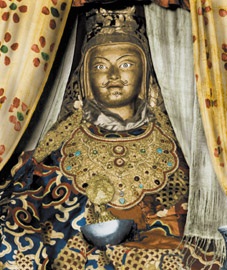
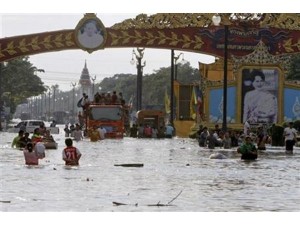
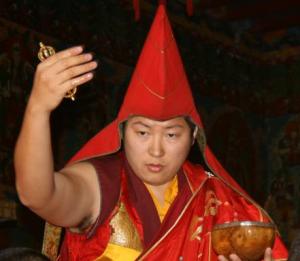
(October 15 2011)
Rinpoche and ourselves have been keeping ourselves updated regarding the situation in Thaliand via the BBC News. Rinpoche reassures the Thai sangha that you are all in Rinpoche’s prayers and aspirations always. Rinpoche advises all of you to make fervent supplications to Guru Rinpoche, and to have very strong faith in Guru Rinpoche during these difficult times.
With compassions and prayers,
Gem
On behalf of Phakchok Rinpoche
Guru Rinpoche Day
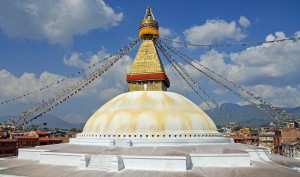
Dear Friends, Near and Far:
Greetings to you all from the Kathmandu Valley. By the time you receive this mail from me, many of you are getting ready to go to bed and many getting ready to wakeup. But wherever you are, I hope that you and your loved ones are happy and healthy. Today is again the 10th day of the lunar calender and hence Guru Rinpoche’s day! And like the many other mails that I’ve been dropping in your mailbox on each GRD over the last three years, I hope this one also achieves in some subtle way to remind you to not go astray from the dharma.
And now to continue on where I left off last month from “Calling the Guru from Afar“. Last time we went over the four prelimanary contemplations: samsara, precious human birth, impermanance, and Read the rest of this entry/อ่านรายละเอียด »
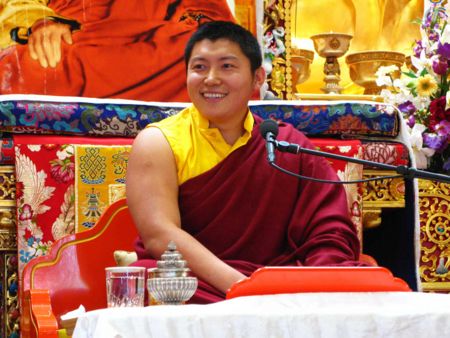
เป็นผู้สืบทอดการปฏิบัติสาย ชกจูร์ ลิงปะ (Chok Gyur Lingpa Lineage) แห่งนิกายญิงมา-ปะ (Nyingma School of Early Translation) ซึ่งเป็นนิกายโบราณของพุทธศาสนาวัชรยาน ท่านสืบเชื้อสายมาจาก ชกลิง ริมโปเช (His Eminence Chokling Rinpoche) และ ดีเชน ปาลดรอน (Dechen Paldron) เกิดเมื่อปี พ.ศ. 2525 ที่ประเทศเนปาล ท่านเดินทางเผยแผ่พุทธศาสนาในหลายๆประเทศ ซึ่งเอกลักษณ์ในการถ่ายทอดคำสอนของท่านมีลักษณะตรงไปตรงมา และเข้าใจง่าย
ตำแหน่งปัจจุบัน
• ผู้ครองบัลลังก์สายการปฏิบัติ “ รีโวเช ตักลุง การ์จู (Riwoche Taklung Kagyu Lineage) ” แห่งวัดรีโวเช (Riwoche Monastery)
• วัชราจารย์ของวัดกาญิง เชดรุป (Vajra Master: Ka-Nying Shedrub Ling Monastery) ที่ โพธนาถ (Boudhanath) เมืองกาฐมัณฑุ ประเทศเนปาล
• เจ้าอาวาสวัดโดงัก ญีดา ซุงเทรล เชดรุป รัลตรี (Abbot of Do-ngak Nyida Zungdrel Shedrab Raldri Ling Monastery) ประเทศเนปาล
• เจ้าอาวาสวัดปัล การ์จู เชดรุป ตาชี ทาเกย์ พุนสก (Abbot of Pal Kagyu Shedrub Tashi Dhargye Phuntsok Ling Monastery) ประเทศเนปาล
• ประธานของ รังจุง ยีชี เช็นเปน (President of Rangjung Yeshe Shenpen) อันเป็นองค์กรการกุศล เพื่อช่วยเหลือผู้ยากไร้ และผู้ด้อยโอกาสด้านการศึกษาและสาธารณสุขในประเทศเนปาล
• ศาสตราจารย์วิชาพุทธปรัชญา (Professor of Buddhist Philosophy) ที่สถาบันรัง จุง ยีชี (Rangjung Yeshe Institute Shedra) ศูนย์พุทธศาสนศึกษา (Center of Buddhist Studies) มหาวิทยาลัยกาฐมัณฑุ (Kathmandu University) ประเทศเนปาล ท่านสอนพุทธปรัชญาทั่วไปโดยเฉพาะอย่างยิ่งปรัชญามาธยมิกะ (The Middle Way)
การศึกษา
• ได้รับวุฒิทางการศึกษาระดับ “เคนโป (mKhan po)” ซึ่งเทียบเท่าปริญญาเอก (Ph.D.) ทางศาสนาวิทยา (Doctor of Divinity) จากองค์สมเด็จดาไลลามะที่ 14 (His Holiness 14th Dalai Lama) และจาก จงซาร์ เคียนเซ ริมโปเช (H.E. Dzongzar Khyentse Rinpoche)
• จบการศึกษาหลักสูตรพุทธปรัชญาที่สถาบันการศึกษาพุทธศาสนาชั้นสูงจงซาร์ (Dzongsar Institute of Advanced Buddhist Studies) ที่ เมืองบีร์ (Bir) มณฑลหิมาจัล (Himachal Pradesh) ประเทศอินเดีย (India) ซึ่งเน้นการศึกษาด้านคำสอนของ สายสาเกียปะ กับ เคนเชน กุงกา วังชุก ริมโปเช (Khenchen Kunga Wangchuk Rinpoche) และ จงซาร์ เตียนเซ ริมโปเช (H.E. Dzongsar Khyentse Rinpoche) ซึ่งท่านใช้เวลาในการศึกษาเพียง 7 ปี จากเวลาปกติ 9 ปี
งานเผยแผ่
• วิทยากรรับเชิญบรรยายธรรม ณ ศูนย์ปฏิบัติธรรมหลายแห่งทั่วโลก อาทิ ประเทศเดนมาร์ก ประเทศเยอรมันนี ประเทศออสเตรีย ประเทศสวิสเซอร์แลนด์ ประเทศเบลเยี่ยม ประเทศสหรัฐอเมริกา ประเทศแคนาดา ประเทศอเมริกา ประเทศอเมริกาใต้ และ ประเทศแถบเอเซียตะวันออกเฉียงใต้ ฯลฯ
• ผู้ก่อตั้งศูนย์ปฏิบัติธรรมหลายแห่งในประเทศมาเลเซีย
Kyabgon Phakchok Rinpoche is a lineage holder of the Profound Treasures of Chokgyur Lingpa from the Nyingma School of Early Translation and throne-holder of Riwoche Taklung Kagyu Lineage.
Currently duties
• Vajra Master of Ka-Nying Shedrub Ling Monastery (in Boudhanath Kathmandu, Nepal)
• Abbot of Pal Do-Ngak Nyida Zungdrel Mindrol Norbuling Monastery (Nepal)
• Abbot of Pal Kagyu Shedrub Tashi Dhargye Phuntsok Ling Monastery (Nepal)
• President of Rangjung Yeshe Shenpen Nepal, a volunteer-based, non-profi t organization that serves the poor and disadvantaged in Nepal
• Professor of Buddhist Philosophy, Rangjung Yeshe Institute Shedra, Center of Buddhist Studies, Kathmandu University, where he teaches general Buddhist philosophy with emphasis on the Middle Way
Education
Phakchok Rinpoche received the Khenpo title (similar to a Doctor of Divinity) from H.H. 14th Dalai Lama and H.E. Dzongsar Khyentse Rinpoche. He completed in seven years the traditional nine-year curriculum of Buddhist philosophy at the Dzongsar Institute of Advanced Buddhist Studies, Bir, Himachal Pradesh, India, where he specialized in studies of the Sakya School of Tibetan Buddhism under the guidance of Khenchen Kunga Wangchuk Rinpoche and H.E. Dzongsar Khyentse Rinpoche.
An enthusiastic and vibrant young teacher, Phakchok Rinpoche’s lectures are direct and easily understood. Since 1999 he has served as Professor of Buddhist Philosophy at the Rangjung Yeshe Institute Shedra, Center of Buddhist Studies, Kathmandu University, where he teaches general Buddhist
philosophy with emphasis on the Middle Way. He has also been guest-lecturer at numerous centers in Europe, North America, South America, and South East Asia.
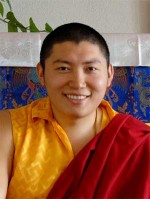 Greetings Everyone,
Greetings Everyone,
I hope you’ve all been well and happy. It’s almost midnight here in the foothills of the Himalayas and before the next day rolls in, I want to send you a little information about my whereabouts before this Guru Rinpoche day ends.
As mentioned in my last message, today is the first day of the pilgrimage and in order to mark the auspiciousness of this day, we are in Lumbini, the birthplace of Gautama Buddha. A pilgrimage is an important act of devotion and faith as it enables us to accumulate merit and purify our defilements and obscurations of the body, speech and mind by the power of the blessings of the sacred sites.
The Buddha said:
“Monks, after my passing away, if all the sons and daughters of good family and the faithful, so long as they live, go to the four holy places, they should go and remember: here at Lumbini the enlightened one was born; here at Bodhgaya he attained enlightenment; here at Sarnath he turned twelve wheels of Dharma; and here at Kushinagar he entered parinirvana. Monks, after my passing away there will be activities such as circumambulation of these places and prostration to them….. a pilgrimage to them [the four places] will help to purify their previously accumulated negative karmas, even the five heinous actions….”
Along with the four holy places we’ll be visiting other sacred sites as well and during the entire pilgrimage, I’ll think of you all and make multiple aspirations for your happiness and wellbeing.
Before I say my goodbye, I want to remind you all to constantly practice bodhicitta based on a pure motivation defined by the union of both compassion and wisdom. As mentioned by Dza Patrul Rinpoche in his Words of My Perfect Teacher, bodhicitta can be viewed as having different levels. He mentions that the highest level is that of the shepherd, who makes sure that all his sheep arrive safely ahead of him and places their welfare before him. Next is the path of the boatman, who ferries his passengers across the river and then ferries himself back. And finally the lowest is that of the way of the king who primarily thinks of his own benefit but who recognizes that his benefit depends crucially on that of his kingdom and his subjects.
Thinking of all you on this GRD and wishing you all a very merry Christmas and a very happy New Year.
Sarva Mangalam,
Phakchok Rinpoche

Kyabgon Phakchok Rinpoche visit to Bangkok in January 2011
Details in English can be found below as well as at Little Bangkok Sangha www.littlebang.org
สมเด็จพักชกริมโปเช บรรยายธรรม มกราคม 2554
For synopsis of the lecture program
บทความย่อของธรรมบรรยายกรุณาดูที่
https://www.mongkol.org/phakchok-rinpoche/kyabgon-phakchok-rinpoche-visit-jan-2011-synopsis/
เสาร์ 15 มกราคม
1330-1630 ธรรมบรรยาย เมตตาและกรุณาในพุทธศาสนา และ พิธีอภิเษกมนตรา พระอวโลกิเตศวร ณ สวนโมกข์กรุงเทพ ข้างสวนรถไฟ
แผนที่ http://littlebang.org/2010/12/31/hhpcr-sat-15th-january-bia/
อาทิตย์ 16 มกราคม
1230-1500 พิธีอภิเษกมนตรา พระไภษัชยคุรุ (พระพุทธเจ้าบรมครูแห่งยารักษาโรค) ณ วัดทรงธรรมกัลยาณี ตำบลพระประโทน จังหวัดนครปฐม
แผนที่ http://littlebang.org/2010/12/31/hhpcr-sun-16th-jan-wat-songtam-kalyani/
จันทร์ 17 มกราคม
0900-1130 ธรรมบรรยายและบูชาพระไภษัชยคุรุ ณ ม.มหิดล ศาลายา อ.พุทธมณฑล จ.นครปฐม วิทยาลัยศาสนศึกษา ห้องประชุมนานาชาติ ชั้น 2
แผนที่ http://www.crs.mahidol.ac.th/eng/contact.htm
1800-2030 ธรรมบรรยาย “หนทางสู่ความสุขใจ” ณ โรงแรมตวันนา ถ.สุรวงศ์
แผนที่ http://littlebang.org/2010/12/31/hhpcr-mon-17th-jan-tavana-hotel/
อังคาร 18 มกราคม
1800-2030 ธรรมบรรยาย “วิธีขจัดอารมณ์ที่ไม่ปรารถนา” (ภาษาอังกฤษ ไม่มีแปลไทย) ณ โรงแรมตวันนา ถ.สุรวงศ์
แผนที่ http://littlebang.org/2010/12/31/hhpcr-tue-18th-jan-english-only/
พุทธ 19 มกราคม
1000-1500 ธรรมบรรยาย “การฝึกจิต” ณ ม.ราชภัฏสวนสุนันทา ชั้น 5 อาคารศูนย์วิทยบริการ เขตดุสิต กรุงเทพฯ (ผู้เข้าร่วมต้องนำอาหารกลางวันมาเอง)
แผนที่ http://www.ssru.ac.th/app/front/home/popup_map.php
1900-2100 ธรรมบรรยาย “แก่นแท้แห่งวิถีพระโพธิสัตว์” ณ DMG อาคารอัมรินทร์พลาซ่า
แผนที่ http://littlebang.org/2010/12/31/hhpcr-wed-19th-jan/
พฤหัสบดี 20 มกราคม 1900-2100 ธรรมบรรยาย “ธรรมะจากมหาคุรุแห่งอินเดีย” (ภาษาอังกฤษ ไม่มีแปลไทย) ณ สยามสมาคม แยกอโศก
แผนที่ http://littlebang.org/2010/12/31/hhpcr-thrs-20th-jan-siam-society/
ศุกร์ 21 มกราคม
1200-1400 ธรรมบรรยาย “โพธิจิต – หนทางสู่การตรัสรู้” ณ อาคาร CP สีลม
แผนที่ http://littlebang.org/2010/12/31/hhpcr-fri-21-jan-cp-tower/
เสาร์ 22 – อาทิตย์ 23 มกราคม
ปฏิบัติสมาธิกับท่านริมโปเช เต็มสองวัน ณ ศาลาแดงเพลส ซอย ศาลาแดง หลังโรงแรมดุสิตธานี ถ.สีลม กรุงเทพฯ (ต้องค้างคืนและลงทะเบียนล่วงหน้า) ติดต่อคุณราม 0819855564 หรือ ติดต่อเราที่นี่
*ข้อมูลอาจมีการเปลี่ยนแปลง กรุณาติดตามที่ www.mongkol.org
For full information in English with maps please check:
http://littlebang.org/2010/12/30/phakchok-rinpoche-bkk-schedule/
All talks in English and Thai except specifically mentioned:
Saturday 15th Jan
1330-1630 Loving Kindness and Compassion in Buddhism with Avalokiteshvara (Chenrezig) empowerment @ Suan Mok Krungthep, next to Mo-chit BTS station
Location map: http://littlebang.org/2010/12/31/hhpcr-sat-15th-january-bia/
Sunday 16th Jan
1000-1500 Medicine Buddha empowerment @ Bhikkhuni Dhammananda’s temple – Wat Song Dhamma Kalyani in Nakorn Pathom (must bring your own lunch)
Location details and map: http://littlebang.org/2010/12/31/hhpcr-sun-16th-jan-wat-songtam-kalyani/
Monday 17th Jan
0900-1130 Medicine Buddha Dharma talk and Puja @ Mahidol University, Salaya campus, College of Religious Studies, International Conference room on 2nd floor
Location map: http://www.crs.mahidol.ac.th/eng/contact.htm
1800-2030 The Path to a Happy Mind @ Tawana Hotel
Location map: http://littlebang.org/2010/12/31/hhpcr-mon-17th-jan-tavana-hotel/
Tuesday 18th Jan
1800-2030 How to dispel negative emotions (English only) @ Tawana Hotel
Location map: http://littlebang.org/2010/12/31/hhpcr-tue-18th-jan-english-only/
Wednesday 19th Jan
1300-1500 Mind training @ Rajabhat University – Suan Sunantha Campus, 5th floor Vithayaborikarn building, Khet Dusit, Bangkok
Location map: http://www.ssru.ac.th/app/front/home/popup_map.php
1900-2100 Essence of Bodhisattva @ DMG hall, Amarin plaza
Location map: http://littlebang.org/2010/12/31/hhpcr-wed-19th-jan/
Thursday 20th Jan
1900-2100 Enlightened Buddhist teachings of the great Indian masters (English only) @ Siam society, Asok intersection
Location map: http://littlebang.org/2010/12/31/hhpcr-thrs-20th-jan-siam-society/
Friday 21st Jan
1200-1400 Bodhicitta – The Path to Enlightenment @ CP Tower, Silom road
Location map: http://littlebang.org/2010/12/31/hhpcr-fri-21-jan-cp-tower/
Saturday 22nd – Sunday 23rd Jan
Full two days Meditation retreat @ Saladang place, Soi Saladang, Silom road, behind Dusit Thani hotel. Must reserve beforehand, number of participants is limited contact Ram at 081-9855564 or contact us here
Location: Saladang place is in the Soi Saladang just behind Dusit Thani hotel at the beginning of Silom road.
 Dear All,
Dear All,
How have you all been? Happy and Healthy, I hope.
Today is again Guru Rinpoche Day, but a special one. It was during the 10th of this lunar month back in the 8th century, when Guru Rinpoche first arrived into Tibet on the invitation of King Trisong Detsen with the suggestion of the great Indian Buddhist master, Shantarakshita to subdue the local hostile negative forces and to consecrate the great monastery of Samye and to forever plant the unshakable seed of sacred Buddha dharma. He was thus known as Padmasambhava, the Lotus-Born Guru.
The 38th King or the 2nd of the Three Dharma Kings of Tibet, Trisong Detsen was indeed pivotal in introducing Buddhism to Tibet and hence a great king, yet a simple 11th century yogi states that there is simply no king like him. In a beautiful musical score titled “faith”, which a friend of mine gave me, I first heard about the above statement. In which, Sogyal Rinpoche recites the life and liberation of this extraordinary great yogi so eloquently that tears of devotion naturally outpours.
And it goes something like this: (verbatim)
Milarepa said, I am a king, yet no king like me I have such wealth Milarepa as you know was Tibet’s great saint, yogi and poet Who inspired millions of people But he spent the years in retreat in the humblest condition Wearing just a lounge cloth and eating nettles So much that his body became emaciated and became almost green
Yet he says, I am a king and yet no king like me I have such wealth I have the seven attributes that lead to enlightenment I have the eight noble path This is my wealth
My treasure house is filled with these riches I have the sky above as my castle I have the ground below as my state I am the happiest king in the world This is what Dilgo Khyentse Rinpoche use to say
Once when you have this view
All the delusory perception of samsara may rise in your mind And be like the sky When the rainbow appears in front of it You are not particularly flattered And when the clouds appear, when the dark clouds appear You are not particularly disappointed either There is a deep sense of contentment
And you chuckle from inside
As you see the façade of samsara and nirvana This view will keep you constantly amused Like a little smile bubbling away all the time Enjoy yourself, this self And you’ll be happy And I wish you that I wish you my deepest wish that you discover that for yourself This great treasure And you keep bubbling, bubbling, bubbling, bubbling and become contagious also
The lines above by Rinpoche are simple yet profound in their meaning. For those of you who need to refresh your memory on the seven attributes and the eight noble paths, here’s a brief overview:
The Seven Attributes: (Qualities)
Faith, discipline, generosity, learning, a sense of moral shame, a sense of ethical conscience to oneself, and intelligence.
The Noble Eightfold Path leading to the cessation of suffering:
Right view, intention, speech, action, livelihood, effort, mindfulness, and concentration.
Enjoy and have a wonderful day!
Sarva Mangalam,
Phakchok Rinpoche
 Dear Everyone,
Dear Everyone,
Today I thought I’d answer a question that I get asked quite frequently by students, the difference between the mind section and the wisdom section.
In the mind section, the key is noticing. It is extremely important to notice negative emotions. There is a difference between judgment and noticing. When you have judgment then your emotions arise because judgment comes with duality. When you notice the emotions don’t arise because you don’t follow the second thought, it is only recognition of a negative emotion, nothing more.
The wisdom section can be categorized into the appearance of wisdom and essential wisdom. The appearance of wisdom is free from duality, from bad and good. Don’t think that it is bad if you have a negative emotion and good when you have a positive emotion. After all whether if it’s positive or negative, it is just an emotion, which is impermanent. One must participate in pure perception. See all emotions, positive and negative with pure perception and hence neither good nor bad. Essential wisdom on the other hand involves less judgment and without engaging. Not clinging onto the emotions, not holding onto the emotions, just letting them be. If you hold onto the emotions once they arise and do not let them dissolve naturally then that is not essential wisdom. Notice them and let them be. They will dissolve on their own, naturally. This is important to understand and practice. This is the essential teaching.
Right now I am in the very south of Brazil, near Port Alegra at Khandro Ling. Today with the sangha here we auspiciously performed Guru Rinpoche’s Shower of Blessing tsok offering. During the tsok offering I thought of you all and had you all in my heart, praying for your long life, good health, and prosperity.
Sarva Mangalam,
Phakchok Rinpoche

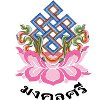








 Greetings Everyone,
Greetings Everyone,